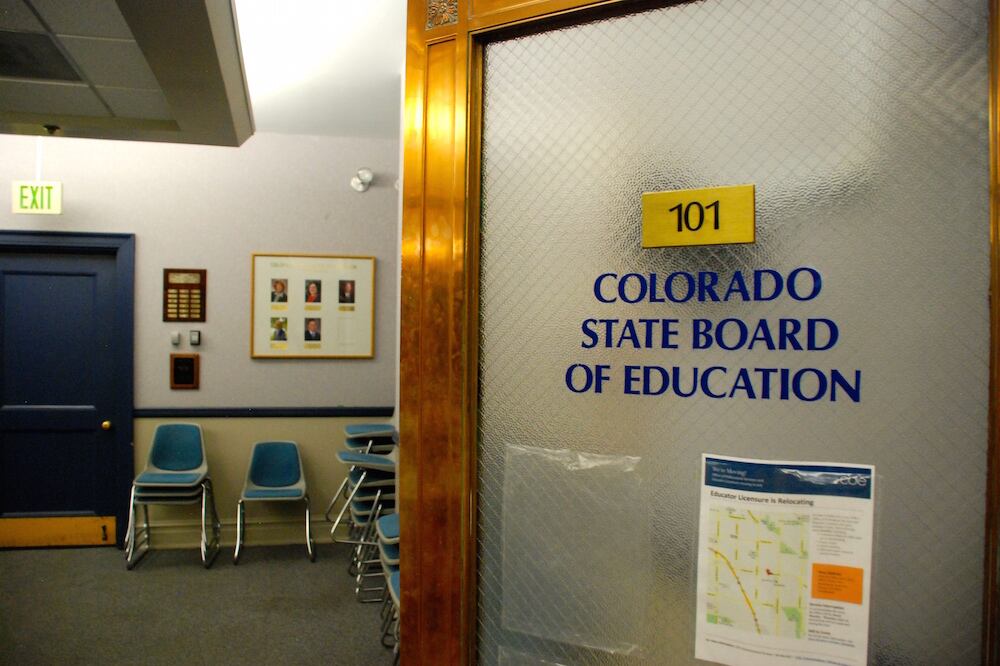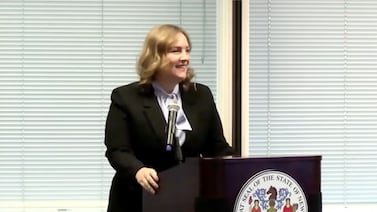Sign up for Chalkbeat Colorado’s free daily newsletterto get the latest reporting from us, plus curated news from other Colorado outlets, delivered to your inbox.
A longtime Pueblo charter school with more than 800 K-12 students will close at the end of the year after losing an appeal before the State Board of Education on Thursday.
The board voted 7-1 to reject Chávez/Huerta K-12 Preparatory Academy’s request to overturn the Pueblo 60 district’s January decision to end the charter contract because of what district officials described as ongoing fiscal mismanagement at the school.
The decision spells the end for a school that opened in 2001 to great fanfare, but has encountered a litany of troubles over the past two decades. In recent years, even as a $30 million state grant helped Chávez/Huerta build a new middle school and renovate its high school, the school’s enrollment has declined, it’s carried a lot of debt, and it’s had a revolving door of directors.
Richard Orona, the school’s lawyer, acknowledged during Thursday’s appeal hearing that the school had “serious issues” in the past, but generally described the school as on the right track now.
“We looked within ourselves for the answer, and we found it,” he said. “We eliminated our management team. We eliminated board members. They even fired legal counsel and brought me in.”
But most State Board members were skeptical, noting that school officials didn’t offer a clear plan for reversing enrollment declines or making large debt payments set to come due in the 2026-27 school year. The school enrolls 844 students this year.
Board Chair Rebecca McClellan worried those problems could lead to a sudden closure in the middle of a future school year, which she described as “a worst-case scenario.”
Some board members expressed frustration that Chávez/Huerta officials didn’t take ownership of years of problems, and suggested that even if the school was allowed to go to another charter authorizer in order to stay open, its underlying problems would remain.
Early in Chávez/Huerta’s history, it was part of an expanding network of charter schools lauded for impressive test scores and a unique mariachi music program. Its founder Lawrence Hernandez earned accolades at the White House during George W. Bush’s administration and a spot in a PBS documentary.
But controversy and financial scandals eroded the school’s reputation.
Three other Chavez charter schools — two in Colorado Springs and one in Denver — closed years ago, and a fourth, an online charter called GOAL, left the network in 2008 and has a questionable track record of its own.
Today, few students at Chávez/Huerta, most of whom are Hispanic and from low-income families, are proficient in math and reading, based on state test results. Both its elementary and middle school are labeled “turnaround” schools, the state’s lowest rating. Its high school, which has the only early college program in southern Colorado, is doing somewhat better and has the state’s second-highest rating.
Board member Karla Esser acknowledged that the school’s closure in a couple of weeks will be devastating to students and families.
“My hope for the district is … you give as much deference to these families and the teachers as necessary,” she said.
Projected enrollment decline seals charter school’s fate
Historically, the State Board of Education has agreed with charter schools in appeal cases about half the time, according to records from the Colorado Department of Education. Including the Chávez/Huerta case, the State Board of Education has considered 16 charter school appeals by 13 schools over the past seven years. Most cases centered on a district’s rejection of a charter school application.
Besides the Chávez/Huerta case, only one other appeal centered on a school district’s decision to close a charter school once it was open. In that case, the charter school — Vega Collegiate Academy in Aurora — won the appeal and was allowed to stay open.
The fate of Chávez/Huerta came to a head in January, when the Pueblo 60 school board voted not to extend the school’s contract after this school year, citing a history of poor financial management. Under state law, charter schools can appeal such decisions to the State Board of Education.
In a report describing its reasoning to the State Board, the district said the school “almost missed payroll” last year, consistently failed to submit “accurate and timely financial documents” to the district, and caused the district to be labeled “delinquent” by the state auditor in 2024 because of the school’s delayed financial submissions.
The report also noted that Pueblo 60 officials began worrying in August 2023 that the school was at risk of closing that school year because of insolvency.
Officials from Chávez/Huerta countered in their own report that the district’s complaints were mostly about “innocuous bookkeeping errors” and that they had hired an outside accounting firm to revamp the school’s financial systems.
The district’s report also noted that the school’s enrollment could shrink enough by next school year that it won’t have enough money to stay afloat.
Chávez/Huerta “projects that its enrollment for this fall will be 800 — 40 fewer than this year and 50 fewer than it needs to continue operations,” the district’s report said.
During Thursday’s hearing, Sarah Siegrist, the CEO of the accounting firm working with the school, confirmed that the school expects only 800 students next year.
Responding to a board member’s question about what level enrollment is too low to ensure financial viability, she said, “780 is starting to get to a level that we can’t function.”
That was the tipping point for Board Member Lisa Escárcega, who said she’d come into the hearing favoring the school’s argument, but ended up voting in the district’s favor.
“To hear that you could only lose 20 more students and that might put you into closure, that kind of tipped me,” Escárcega told Chávez/Huerta officials sitting before her. “You aren’t going to know your numbers till August, September, October … I just don’t see it.”
Board member Kristi Burton Brown voted against the motion. Board member Sherri Wright was absent.
Ann Schimke is a senior reporter at Chalkbeat, covering early childhood issues and early literacy. Contact Ann at aschimke@chalkbeat.org.





